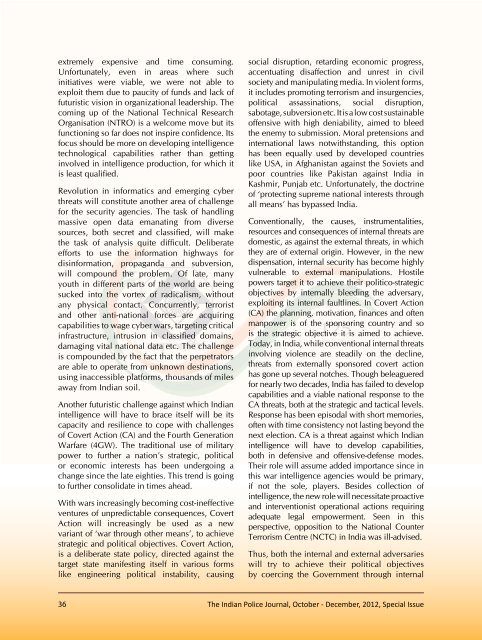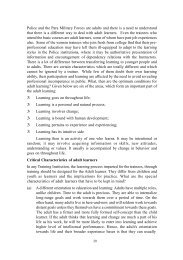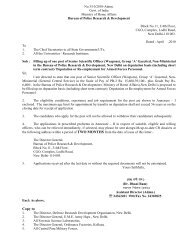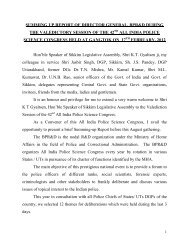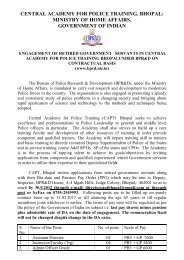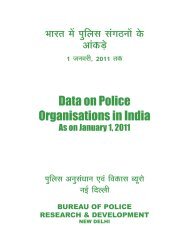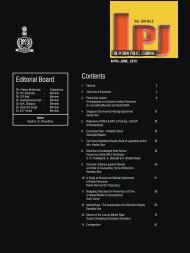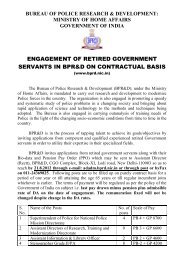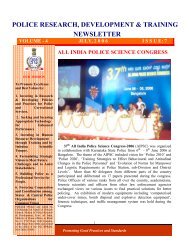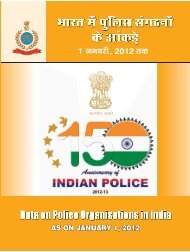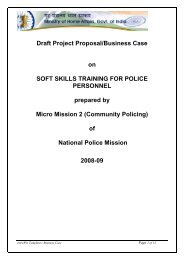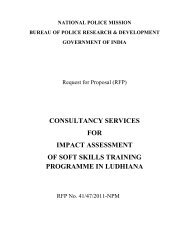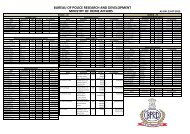extremely expensive <strong>and</strong> time consuming.Unfortunately, even in areas where suchinitiatives were viable, we were not able toexploit them due to paucity <strong>of</strong> funds <strong>and</strong> lack <strong>of</strong>futuristic vision in organizational leadership. Thecoming up <strong>of</strong> the National Technical <strong>Research</strong>Organisation (NTRO) is a welcome move but itsfunctioning so far does not inspire confidence. Itsfocus should be more on developing intelligencetechnological capabilities rather than gettinginvolved in intelligence production, for which itis least qualified.Revolution in informatics <strong>and</strong> emerging cyberthreats will constitute another area <strong>of</strong> challengefor the security agencies. The task <strong>of</strong> h<strong>and</strong>lingmassive open data emanating from diversesources, both secret <strong>and</strong> classified, will makethe task <strong>of</strong> analysis quite difficult. Deliberateefforts to use the information highways fordisinformation, propag<strong>and</strong>a <strong>and</strong> subversion,will compound the problem. Of late, manyyouth in different parts <strong>of</strong> the world are beingsucked into the vortex <strong>of</strong> radicalism, withoutany physical contact. Concurrently, terrorist<strong>and</strong> other anti-national forces are acquiringcapabilities to wage cyber wars, targeting criticalinfrastructure, intrusion in classified domains,damaging vital national data etc. The challengeis compounded by the fact that the perpetratorsare able to operate from unknown destinations,using inaccessible platforms, thous<strong>and</strong>s <strong>of</strong> milesaway from Indian soil.Another futuristic challenge against which Indianintelligence will have to brace itself will be itscapacity <strong>and</strong> resilience to cope with challenges<strong>of</strong> Covert Action (CA) <strong>and</strong> the Fourth GenerationWarfare (4GW). The traditional use <strong>of</strong> militarypower to further a nation’s strategic, politicalor economic interests has been undergoing achange since the late eighties. This trend is goingto further consolidate in times ahead.With wars increasingly becoming cost-ineffectiveventures <strong>of</strong> unpredictable consequences, CovertAction will increasingly be used as a newvariant <strong>of</strong> ‘war through other means’, to achievestrategic <strong>and</strong> political objectives. Covert Action,is a deliberate state policy, directed against thetarget state manifesting itself in various formslike engineering political instability, causingsocial disruption, retarding economic progress,accentuating disaffection <strong>and</strong> unrest in civilsociety <strong>and</strong> manipulating media. In violent forms,it includes promoting terrorism <strong>and</strong> insurgencies,political assassinations, social disruption,sabotage, subversion etc. It is a low cost sustainable<strong>of</strong>fensive with high deniability, aimed to bleedthe enemy to submission. Moral pretensions <strong>and</strong>international laws notwithst<strong>and</strong>ing, this optionhas been equally used by developed countrieslike USA, in Afghanistan against the Soviets <strong>and</strong>poor countries like Pakistan against India inKashmir, Punjab etc. Unfortunately, the doctrine<strong>of</strong> ‘protecting supreme national interests throughall means’ has bypassed India.Conventionally, the causes, instrumentalities,resources <strong>and</strong> consequences <strong>of</strong> internal threats aredomestic, as against the external threats, in whichthey are <strong>of</strong> external origin. However, in the newdispensation, internal security has become highlyvulnerable to external manipulations. Hostilepowers target it to achieve their politico-strategicobjectives by internally bleeding the adversary,exploiting its internal faultlines. In Covert Action(CA) the planning, motivation, finances <strong>and</strong> <strong>of</strong>tenmanpower is <strong>of</strong> the sponsoring country <strong>and</strong> sois the strategic objective it is aimed to achieve.Today, in India, while conventional internal threatsinvolving violence are steadily on the decline,threats from externally sponsored covert actionhas gone up several notches. Though beleagueredfor nearly two decades, India has failed to developcapabilities <strong>and</strong> a viable national response to theCA threats, both at the strategic <strong>and</strong> tactical levels.Response has been episodal with short memories,<strong>of</strong>ten with time consistency not lasting beyond thenext election. CA is a threat against which Indianintelligence will have to develop capabilities,both in defensive <strong>and</strong> <strong>of</strong>fensive-defense modes.Their role will assume added importance since inthis war intelligence agencies would be primary,if not the sole, players. Besides collection <strong>of</strong>intelligence, the new role will necessitate proactive<strong>and</strong> interventionist operational actions requiringadequate legal empowerment. Seen in thisperspective, opposition to the National CounterTerrorism Centre (NCTC) in India was ill-advised.Thus, both the internal <strong>and</strong> external adversarieswill try to achieve their political objectivesby coercing the Government through internal36The Indian <strong>Police</strong> Journal, October - December, 2012, Special Issue
violence <strong>and</strong> destabilisation. This willincreasingly take the world to what is knownas Fourth Generation Warfare (4GW), conflictsin which the civil society will play a primaryrole. The subversive <strong>and</strong> violent groups disguisethemselves as crusaders <strong>of</strong> disaffected oralienated sections <strong>of</strong> the society <strong>and</strong> indulgein violence <strong>and</strong> other unlawful activities. Thiswill be a war against the invisible enemy hidingwithin the civil society, stunning to silencethe majority through violence, fear <strong>and</strong> terror<strong>and</strong> making the governance impossible forits inability to protect them. Inability <strong>of</strong> theGovernments to protect their civil societies <strong>and</strong>redress their genuine grievances, make themhighly vulnerable to the mechanizations <strong>of</strong>hostile intelligence agencies.The future pattern <strong>of</strong> conflicts would increasinglybe more civil society centric. This fight againstan invisible enemy, conceptualised as FourthGeneration Warfare (4GW), will aim at collapsingthe enemy internally rather than physicallydestroying him through military might. Asobserved by William Lind, “Distinction betweenwar <strong>and</strong> peace will be blurred to the vanishingpoint.” In this nonlinear war against the invisibleenemy, there will no defined battle fields <strong>and</strong>the difference between civil <strong>and</strong> military targetswould get obliterated. The disaffected <strong>and</strong>alienated sections <strong>of</strong> the society will be targetedby the enemies, both within <strong>and</strong> outside, toprovide cause <strong>and</strong> the cover for subversive <strong>and</strong>violent actions. State security apparatus with highfire power, mobility, technology <strong>and</strong> logistic basewill find themselves at a loss to fight this battle,where there is no defined territory to be dominated<strong>and</strong> visible enemy to be destroyed. Propag<strong>and</strong>a,skilful use <strong>of</strong> media <strong>and</strong> information interventionmay be extensively used by the adversaries todiscredit <strong>and</strong> delegitimise lawfully establishedgovernments. Actions taken by the governmentto protect law abiding citizens or to enforcerule <strong>of</strong> law will be portrayed as persecution<strong>and</strong> oppression, further eroding government’slegitimacy. American war in Vietnam <strong>and</strong> SovietUnion’s fight in Afghanistan are illustrative.Intelligence will be the primary instrumentalitythrough which these wars would be fought. T<strong>of</strong>ight these futuristic conflicts, the intelligenceagencies will have to build an extensive network<strong>of</strong> agents <strong>of</strong> information <strong>and</strong> influence amongpotentially vulnerable sections <strong>of</strong> the society.Psy-war capabilities, integrating modern state<strong>of</strong>-arttechnologies, will have to be adopted. AUS study paper on ‘The Changing Face <strong>of</strong> War:Into the Fourth Generation’ has rightly assertedthat “Fourth generation adversaries will be adeptat manipulating the media to alter domestic<strong>and</strong> world opinion to the point where skillfuluse <strong>of</strong> psychological operations will sometimespreclude the commitment <strong>of</strong> combat forces.Television news may become a more powerfuloperational weapon than armored divisions.”India with its social fault lines, economicinequalities <strong>and</strong> fragmented polity is highlyvulnerable to civil society conflicts that can leadto instability. The external factor in the form <strong>of</strong>activities <strong>of</strong> hostile intelligence agencies, foreignNGOs with a political agenda, trans-borderideological influence <strong>of</strong> some radical or extremistgroups etc., can exploit alienated groups to theiradvantage. Though these threats have existedfor quite some time but with revolution ininformatics, accessibility to new technologies <strong>and</strong>collaborative networking among anti-nationalforces these may become more extensive <strong>and</strong>acute in future. Indian intelligence will have todevelop new capabilities to meet these threats.The challenges that Indian intelligence is goingto face in the years ahead will be much moreserious <strong>and</strong> complex. India’s emergence as amajor power centre, provides it an opportunity,as also adds to its vulnerability. There is a need towork out a long term strategy for transformationalchanges, on one h<strong>and</strong> <strong>and</strong> internal reforms, onthe other. Under a time bound programme, aplan <strong>of</strong> action should be prepared <strong>and</strong> pressedinto action with full earnestness.The Indian <strong>Police</strong> Journal, October - December, 2012, Special Issue 37
- Page 1 and 2: The Indian Police JournalOctober -
- Page 3 and 4: From the Director’s DeskNew Delhi
- Page 5 and 6: 23rd December, 1887: TheJourney beg
- Page 7 and 8: Courtesy - National Archives of Ind
- Page 9 and 10: The Logo released on the completion
- Page 11 and 12: Helmsmen of the IB during thePre-In
- Page 13 and 14: SHRI V.G. VAIDYA, IPS(MAR 1992 TO J
- Page 15 and 16: “Sleeman sahib ki jai”“No Cri
- Page 17 and 18: their life and their problems relat
- Page 19 and 20: Settling down of criminal tribes wa
- Page 21 and 22: perish. Between 1841 and 1848, anot
- Page 23 and 24: In conclusion, I would like to reco
- Page 25 and 26: own race alone, had to be withdrawn
- Page 27 and 28: a bee in his bonnet” 17 , and abo
- Page 29 and 30: epresented by Tilak and his followe
- Page 31 and 32: The agency more and more fine-tuned
- Page 33 and 34: US was brewing, one William Hopkins
- Page 35 and 36: came under the control of Indian mi
- Page 37 and 38: neutralised many efforts by inimica
- Page 39 and 40: e published by the Intelligence Bur
- Page 41 and 42: As DD (Security), IB, I had occasio
- Page 43 and 44: Chhomohlohri, all of them juxtapose
- Page 45 and 46: Dormers Building, ShimlaThe Dormers
- Page 47 and 48: eforms. Warren Commission, on the a
- Page 49: and systems will increasingly come
- Page 53 and 54: one develop. The all pervasive cult
- Page 55 and 56: etween the states and the centre su
- Page 57 and 58: Intelligence Agencies inIndian Demo
- Page 59 and 60: Democracies are, today, everywhere
- Page 61 and 62: depend substantially on the restrai
- Page 63 and 64: Of Pistols and Pigs andthe Old Tidd
- Page 65 and 66: it is lovingly caressed hundreds of
- Page 67 and 68: Through the Eyes of an IB OfficerSh
- Page 69 and 70: an Intelligence agency. He used to
- Page 71 and 72: My J&K ExperienceShri R.K. Kapoor,
- Page 73 and 74: there. We remained stranded there f
- Page 75 and 76: Scaling Himalayan Heights withthe I
- Page 77 and 78: proceed to Dungti to supervise the
- Page 79 and 80: tour of the White House and Lincoln
- Page 81 and 82: into unconsciousness two hours earl
- Page 83 and 84: which was completed successfully wi
- Page 85 and 86: leaders. This happened around the t
- Page 87 and 88: My Unforgettable Yearsin the North-
- Page 89 and 90: stated that Prakash Singh, Assistan
- Page 91 and 92: take her into confidence. That woul
- Page 93 and 94: Police - Intelligence InterfaceShri
- Page 95 and 96: Shreekant Bapat and I surveyed the
- Page 97 and 98: excellence, dedication and commitme
- Page 99 and 100: Immigration, Inter-State Disputes,
- Page 101 and 102:
Observations on India’s State and
- Page 103 and 104:
assessments that arose after the ca
- Page 105 and 106:
levels. The deficiencies of one par
- Page 107 and 108:
of laying a network of useful roads
- Page 109 and 110:
Technology in Intelligence-Future S
- Page 111 and 112:
These are just some of the aspects
- Page 113 and 114:
Figure 6: Open Source Information o
- Page 115 and 116:
events) and inference from evidence
- Page 117 and 118:
9North Atlantic Treaty Organization
- Page 119 and 120:
Shri Dave was posted back to the lB
- Page 121 and 122:
He even suggested separate pay scal
- Page 123 and 124:
The Unsung HeroesThe Intelligence B


